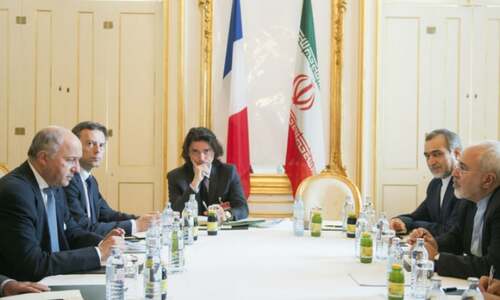TEHRAN: The European Union and United States said on Tuesday they were studying Iran’s response to a “final” draft agreement on reviving a 2015 nuclear accord with major powers the EU presented at talks in Vienna.
The US had already said that it was informing EU foreign policy chief Josep Borrell of its response to the text he submitted on August 8.
The possibility of a deal which might lead to the lifting of US sanctions on Iran’s oil output of 2.5 million barrels per day has already helped trigger a fall in prices on world markets, with US oil futures dropping nearly three percent to finish below $90 a barrel.
A spokesperson for Borrell — who coordinated talks to bring Iran and the United States back into the deal — said the Iranian response was received late on Monday and the EU was consulting with the United States and the other parties “on the way ahead”.
“Everybody is studying the response and this is not the time for the moment to speculate on timing,” Borrell’s spokesperson Nabila Massrali later told a press briefing.
A spokesperson for the US State Department said: “We have received Iran’s comments through the EU and are studying them. We are sharing our views with the EU.” Iran’s official IRNA news agency reported earlier Tuesday that “an agreement will be concluded if the United States reacts with realism and flexibility” to Iran’s response.
Iran’s ISNA news agency cited an “informed source” as saying that Tehran “expects to receive the response of the other side in the next two days”.
IRNA had said that Iran might accept the “final” text drawn up by the European Union to save the deal, which aimed to curb Iran’s nuclear programme in return for sanctions relief.
The deal has been moribund since the 2018 withdrawal of the United States under then president Donald Trump whose administration reimposed crippling sanctions.
An unidentified Iranian diplomat said, according to IRNA, that “the European Union’s proposals are acceptable provided that they provide assurances to Iran on various points, related to sanctions and safeguards” as well as pending issues with the International Atomic Energy Agency. IRNA said the remaining differences centred on three issues.
“The United States has expressed flexibility on two of them verbally but that needs to be incorporated into the text,” the news agency said without elaborating.
“The third issue has to do with a guarantee that the deal will be lasting, and that depends on realism from the United States to reassure Iran.” None of the parties have spelt out in detail the points of contention that are still blocking a deal.
Iran’s demand for an end to US blacklisting of its ideological army, the Islamic Revolutionary Guard Corps, as a “terrorist organisation” has been dropped from the discussions and will instead be handled after the deal, a senior EU official said earlier this month.
The official said progress had also been made on Tehran’s call for guarantees that there will be no repeat of Washington reneging on the deal as it did under Trump in 2018.
Tehran and Washington still have to agree on “issues related to sanctions lifting and a couple of nuclear questions that did not exist in March as the Iranians advanced their programme”, the EU official said.
Iran also wants the UN nuclear watchdog, the IAEA, to end its long-running investigation into traces of enriched uranium found at sites not declared as having hosted nuclear activities. Britain, China, France, Germany, Iran and Russia, as well as the United States indirectly, resumed talks on the nuclear accord earlier in August after a months-long hiatus. The EU-coordinated negotiations to revive the deal known as the Joint Comprehensive Plan of Action, or JCPOA, began in April 2021 before coming to a standstill in March.
The EU said last Tuesday it expected Tehran and Washington to “very quickly” respond to the “final” text aimed at salvaging the deal.
Published in Dawn, August 17th, 2022














































